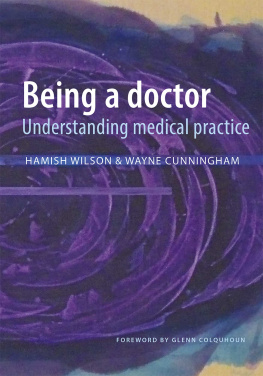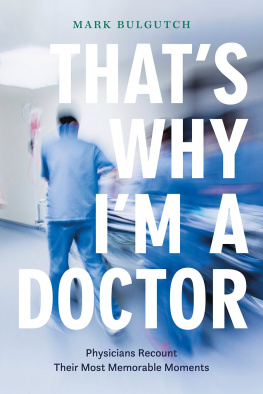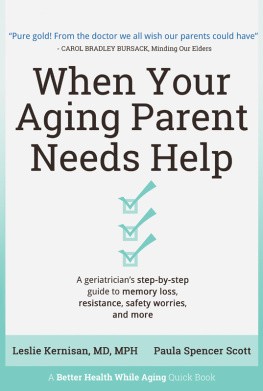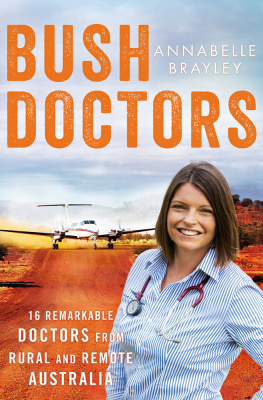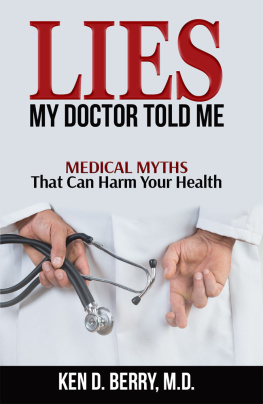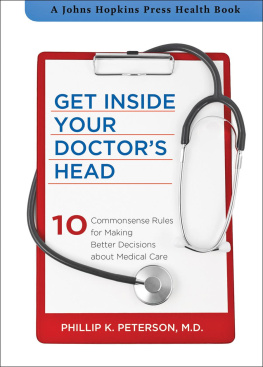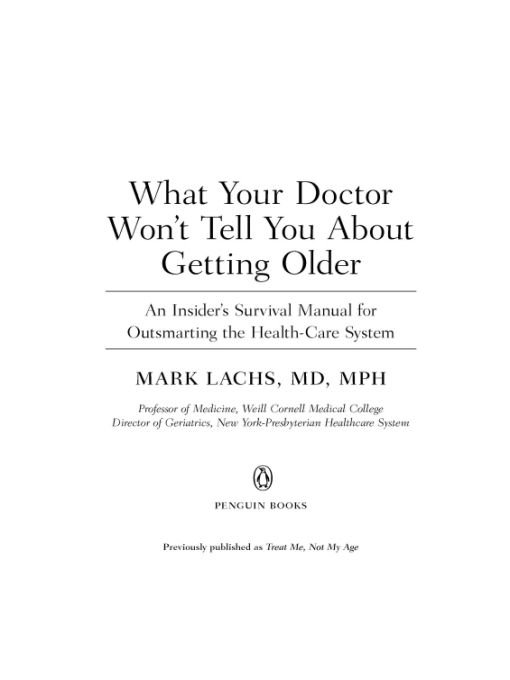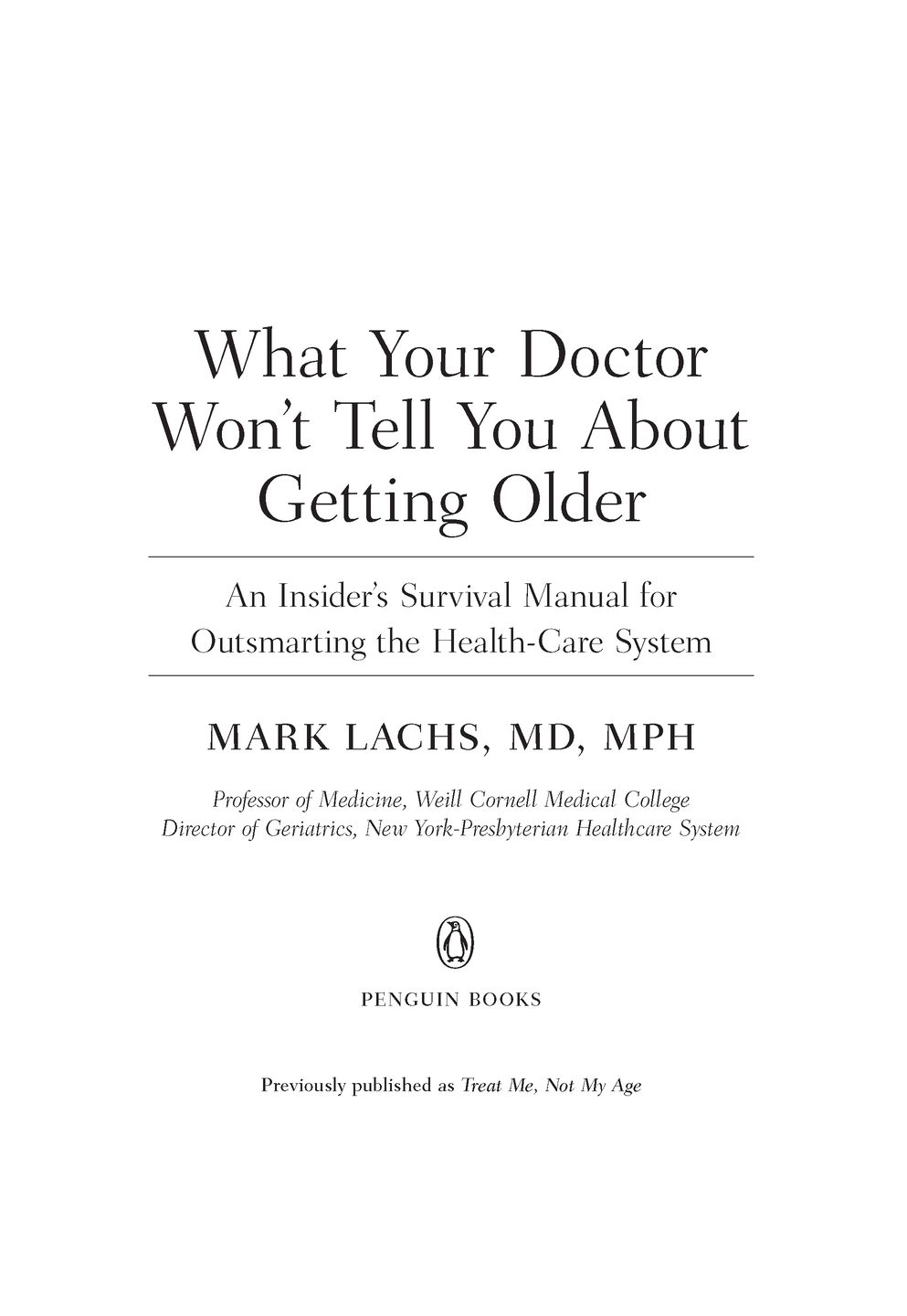Table of Contents
Praise for What Your Doctor Wont Tell You About Getting Older and Mark Lachs
Dr. Mark Lachs has volunteered to be our friend in the [medical] business.... Hes surprisingly candid about the pitfalls and shortcomings of contemporary medicine, especially for old people.... We need a guy like this.
The New York Times
Mark Lachs starts the conversation that most of us are taught not to talk about: What do we do when we, or someone close to us, become older? So many of the resources about this subject are bewilderingly specialized and often confusing, but Dr. Lachs brings all the various elements together, offering guidance and suggestions about all aspects of health and aging. What I loved about this book is how much it feels as if youre having a conversation with a trusted friend who is also incredibly knowledgeable about what to do when advancing years are upon you. What Your Doctor Wont Tell You About Getting Older bridges the gap between confusion and clarity about this inevitable part of our lives. I only wish hed written it sooner!
Nell Newman, president and cofounder, Newmans Own Organics
Finally, one of the most highly regarded experts in our field helps the reader make sense of the increasingly complex health-care landscape for boomers and beyond. Most books about aging these days are about exactly the opposite: never getting old. Lachs assumes the reader is much smarter than that, and as a doctor and a scientist gives highly prescriptive advice on how to navigate broken and confusing systems that impact how we age.
Robert N. Butler, founding director, National Institute on Aging, and president, International Longevity Center
Getting older is sometimes not for the faint of heart! Finally, an upbeat yet responsible book about aging from a brilliant gerontologist and scientist. And its a fun and well-written book to boot!
William Goldman, Academy Awardwinning screenwriter of Butch Cassidy and the Sundance Kid and All the Presidents Men
ABOUT THE AUTHOR
Dr. Mark Lachs is a physician, scientist, and gerontologist at Weill Cornell Medical College in New York City. His research has been published in the New England Journal of Medicine and the Journal of the American Medical Association, and he has appeared on The Today Show, NPRs All Things Considered, and in many other national and local media outlets. His numerous honors and awards include a National Institute on Aging Academic Leadership Award and a Paul Beeson Physician Faculty Scholarship (the countrys preeminent career award in aging). He and his wife, Susan, a nurse practitioner, have three children and live in Connecticut.
For Susan, Joshua, David, and Lauren
ACKNOWLEDGMENTS
The buzzword in aging medicine and research these days is interdisciplinary. That applies to these acknowledgments, because the people who have helped me with this book were recruitedwillingly and unwillinglyfrom all quarters of my personal and professional orbit. Gathered in a room they would constitute truly odd bedfellows, but I like to think that it now all makes sense given the topics tackled in this book, and how Ive tried to present them: one part science, one part social work, and one part stand-up.
I have featured the research of several eminent scientists and clinicians who work in the field of gerontology. Their work is critical to the future of our aging nation. Without fanfare they toil endlessly in areas of scientific inquiry that no one else wants to (or has the superb scientific taste to pursue). Some of their personal and professional quests are featured in the book; several have provided useful edits and ideasSharon Inouye, Eric Coleman, and Sean Morrison to name a few. Others are mentioned in passing or perhaps inadvertently left out altogether; I apologize in advance to these colleagues. Many other geriatricians and gerontologists have reviewed chapters, sections, or permitted interviews to fortify the manuscript and help me develop the ideas. David Reuben at UCLA has been a constant source of advice and counsel throughout my career, as has Dr. Robert Butler, who coined the term ageism. My dear friend Karl Pillemer at Cornell University in Ithaca read the manuscript with both an academic and populist eye; David Pomeranz from the Hebrew Home for the Aged provided assistance with the section on housing and long-term care, as did Eric Tyson for the chapters involving aging and money. The chapters on older people in the emergency department were ably fortified by Doctors Michael Stern and Carolyn Hullick. Dan Fish and Neil Cutler were generous with their time and ideas in the area of elder law and financial gerontology. While the citation and acknowledgment of these colleagues should in no way be construed as an endorsement of this book or my ideas, I am grateful that so many of the positions I have taken seem to resonate with the aging community.
Patients, families, and friends have contributed terabytes of useful information. Im tempted to say you know who you are, but the truth is, I hope you dont. Although virtually every patient and family member I approached were delighted to tell their tales, Ive gone to great lengths to anonymize them by amalgamating stories and changing names, diseases, genders (except the guy with prostate problems), locations, and some clinical details where warranted. So if you know who you are, I apologize to you, too.
Im also indebted to my work family: The Division of Geriatric Medicine and Gerontology at Weill Cornell Medical CollegeNew York-Presbyterian Hospital. To mention a few of them would be a profound injustice to the rest; every single one of themphysicians, nurses, social workers, support staff, administratorshas taught me something about aging. But I must mention one: my co-chief Ron Adelman, a constant source of encouragement, counsel, knowledge, and friendship.
The senior brass here has also made visionary investments in aging that should serve as an example for other academic medical centers. At the Medical College Dean Tony Gotto has understood and supported geriatrics from day one of his advent. My chairman Andy Schafer and his predecessor Ralph Nachman have listened to my ideas about geriatrics (and my intermittent whining) and given me sage advice about when to battle for my faculty or older constituency (usually battling with me or for me). At New York-Presbyterian Hospital, Herb Pardes, Steve Corwin, and Laura Forese have been similarly supportive, understanding that a great hospital needs a great aging program. Ill simply summarize by saying that I work in one of the finest medical centers in the country, if not the world.
Then there are the mentors who have had considerable influence on my choice of geriatrics and my style of doctoring, teaching, and researching. Towering among them is the late Alvan Feinstein. No one could meld mathematics, Camus, and Myron Cohen like Alvan; he taught me that disparate ideas and people could occupy the same paragraph or PowerPoint presentation and be a thrilling thing of exceptional beauty. The intellectual influence of others from my Yale days are also always with me: Leo Cooney, Ralph Horwitz, and Mary Tinetti are among those who have helped shaped my career.
Various foundations and organizations have been relentless in supporting aging research (including my own), policy, and services. The American Federation for Aging Research (led by Stephanie Lederman), The Hartford Foundation (led by Corrine Rieder), The Starr Foundation (led by Florence Davis), and The Commonwealth Fund (led by Karen Davis) are wonderful examples. The Atlantic Philanthropies has also had an unwavering commitment to geriatrics internationally. Locally, Julio Urbina and Lauren Weisenfeld of the Fan Fox and Leslie R. Samuels Foundation have been the angel investors in improving the lives of older New Yorkers. Sid Stahl at NIA has been my scientific program officer for over a decade, and Im indebted to him not only for his wise counsel, but also for permitting the sabbatical that launched this excursion.


